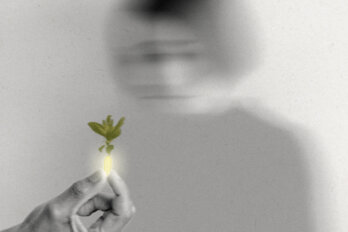In the days when I was deeply involved in synagogue life, my rabbi, also a good friend, had the annual habit of calling me a few weeks before Rosh Hashanah to brainstorm themes for his most important sermon of the year.
In 1984, when he called, I brimmed with enthusiasm for the theme of “memory.” I had a few months previously read a riveting essay in The New York Review of Books, “The Lost Mariner,” written by a neurologist unknown to me at that time called Oliver Sacks. This essay I now urged upon my friend, assuring him it would provide him with a perfect homiletic framework.
“The Lost Mariner” was the captivating tale of one of Sacks’s patients, Jimmy R., a middle-aged man who in 1975 had been admitted to the Home for the Aged near New York, where Sacks was then doing clinical work. He was vigorous and cheerful, and healthy in every respect but one: As a young navy cadet on leave in Manhattan thirty years before, Jimmy had gone on an alcoholic spree one night and awoken with all his memories up to the previous night perfectly intact, but without the smallest ability to form new memories. His brain was stuck. As a result, he lived in a continuous “present” of the moment this function had petrified thirty years back. Jimmy was suffering from what is known as Korsakov’s syndrome.
Jimmy thought he was still nineteen, still in the navy, still looking forward to seeing his girlfriend (long gone and married to another man). He could not have a conversation unless it pertained to incidents he had experienced before the rupture, in which case he could talk for hours, fluently and with the detailed recall of recent experience, which for him it still was.
But with regard to the actual present, he could not hold a conversation, however banal—the weather, how he had slept, what he had eaten for breakfast—or play cards or read a book or watch a film with comprehension, as his memory in the real present was literally only a few seconds long. Looking into a mirror was always a painful shock, as he did not recognize the mature man with grey hair staring back at him. Of course, he recovered from his surprise readily, since the memory of his distress faded almost instantly. And Dr. Sacks had to reintroduce himself every time they met, each time patiently accepting Jimmy R.’s effusive happiness in making his acquaintance.
And so it was impossible for Jimmy R. to form relationships. He was lonely, completely bereft of meaningful human connection, without really understanding why. Every once in a while, during one of their sessions, a shadow would fall across his face, as he struggled with fleeting intuitions telling him that Dr. Sacks was something more than a new acquaintance, and he would even try to voice this idea, but after a few seconds, the impulse would pass, and he was once again introducing himself as though they had never met before.
It was at once a clinically fascinating and a tragic story, and recounted with Oliver Sacks’s extraordinarily eloquent writing style, as riveting in its way as the tale he told. I remember reading it with mounting unease, hoping the end would reveal a cure, or that by some miracle Jimmy R. would wake up one day spontaneously released from his terrible isolation.
But if that had been Jimmy R.’s good luck, Sacks would likely never have chosen him for a subject. Sacks found his literary treasures in people who had suffered great neurological loss, but who found consolation and even periods of joy when a curtain was suddenly pulled back to reveal a modest strategy for adaptation to a cruel fate.
In the case of Jimmy, who happened to be a Catholic, it was attending mass that did the trick. As a member of a congregation, participating in an unchanging ritual that was completely familiar to him, Jimmy was for that precious time not only wholly present in the moment, but at the same time wholly connected to the other worshippers around him. Dr. Sacks noticed that the look of puzzlement and low-grade anxiety he would observe in Jimmy as he kept trying to make sense of his situation had now fallen away. He was at peace, psychologically and spiritually tethered by words and chants and smells to the “present” of the past and the “present” of the present. The mass permitted Jimmy’s healthy nineteen-year-old brain and crippled forty-nine-year-old brain to coexist in complete harmony.
Well, I said to my rabbi, is there not a lesson about memory here for all of us—a lesson particularly fitting to an occasion when, chanting the well-known verses that we have sung all our lives, which connect us to our parents and their parents who had done the same, as we tot up the sins of our past year and look forward to the betterment of our selves, as individuals and as a people, in the new one? He agreed that there was, and the article became the basis of a wonderful sermon on life’s enrichment through the symbiosis of individual and corporate memory.
I had the pleasure of meeting Oliver Sacks a few years later when, as the chair of an educational programming committee at the Saidye Bronfman Centre of the Arts in Montreal (as it then was; it is now the Segal Centre), I proposed him as a speaker, and he accepted our invitation. By then, Sacks had achieved a certain celebrity status, but he had never before made an appearance in Montreal.
As I was to introduce him, I was invited to a rather posh pre-event dinner in his honour by one of the centre’s benefactors. Unfortunately, even though we were sitting side by side, I was inhibited by hero worship, and he was by nature quite shy, so I can’t say our conversation was as scintillating as I would have liked—although I was able to animate him a bit with my recollection of laughing so uproariously in the audience for the British satirical hit, Beyond the Fringe, when it toured North America in 1964—I saw it in Toronto—that his friend Jonathan Miller bestowed a nod in my direction.
When we arrived at the centre, Dr. Sacks became rather jumpy; and it became clear to me that he was experiencing stage fright. As his “minder,” I accompanied him backstage and with apprehension watched him pace about, muttering to himself, and jotting notes down on a blank index card. He had no prepared document with him, and I wondered if it was only now, minutes before he was to go on stage before a packed house (the entire staff, or so it seemed, of the Jewish General Hospital, where he had done rounds earlier that day, had turned out to hear him) that he was actually thinking about what he was going to say.
My heart sank a bit as the great man, surely experienced at this sort of thing, seemed to grow more and more agitated. I should say that before the film Awakenings in 1990 made him a household name, Sacks’s writing was a semi-highbrow addiction, so I was the only member of the committee who had actually read his books, and knew what an entertainment gold mine lay behind that now-moist and pallid brow. We had invited him on the strength of my endorsement, and I had been poised to bask in the glow of his brilliant success. I had not envisaged the possibility that the genius on the page might turn out to be a flop on the stage.
I introduced him. He acknowledged the audience. And began to speak. After a fashion. For the longest five minutes of my career in community volunteerism, Dr. Sacks started, stopped, stuttered, fell silent for endless seconds, laboured to find his theme. I could sense tension building in the audience. I slipped lower and lower and lower into my seat.
And then, magically, a phoenix from what was looking very much like rhetorical ashes, Dr. Sacks found his wings and soared. He hadn’t written a speech because apparently he had no need of one. He had only to release the confidence lurking behind the stage fright or whatever it was that was blocking it. (At the time, I did not know about his debilitating shyness, which was so severe that he referred to it as a “disease.”) For a few perilous moments, he looked very much like someone who might be a candidate for the doctor’s ministrations. And then he somehow rescued himself; the patient became the doctor. Fluent, charming, humorous, captivating, the talk could not have been improved upon, and the audience was enraptured.
Since that memorable encounter, I have read many more, indeed all of Sacks’s books. From his gathering openness in various media, as well as his engrossing 2001 childhood memoir, Uncle Tungsten, in which he describes the beginning of his lifelong obsession with the periodic tables, amongst other idiosyncracies, I came to understand the sources of his myriad quirks.
Dr. Sacks’s background was genetically rich in high intelligence; both parents were doctors, and extended family branches boasted outstanding scholars right and left. But his family life was remarkably impoverished in affection, at least of the demonstrated kind. As a child, Sacks endured a hellish wartime absence from home, which left him permanently scarred psychologically, but thankfully not embittered. Quite the opposite.
I learned too late—how it would have pleased me to discuss this with him at that dinner—that we shared the affliction of prosopagnosia, a difficulty in recognizing faces. All my life, I have been mortified by failing to recognize people I have met before, sometimes many times, unless I see them in the context I have grown used to. Or I confuse someone I know well, because of similar features or hairstyle, with another person I know well. There is nothing quite so embarrassing as the astonished stare of a friend who has been hailed by someone else’s name. How many times have I seen in those visages that humiliating amalgam of shock, annoyance and concern for one’s possible mental decline that makes me want to sink through the floor in embarrassment.
I used to think I didn’t care about people enough to remember them. It was a great comfort to learn from Sacks that the problem originates (at least in part) with an actual neurological deficit. His prosopagnosia was much worse than mine. He describes himself walking past his own apartment building, because he didn’t recognize its façade. He sometimes failed to recognize members of his own family. And once he wondered why the gentleman close to him was staring at him with such curiosity, and then realized he was looking at a mirror. No wonder the man was shy.
I can imagine—and believe I can imagine with more understanding than people who do not share this humbling handicap—the deep social insecurity that must have bedeviled Oliver Sacks on its account. Clearly, though, his ineptitude with the surfaces of life contributed to, and was more than compensated for by the extraordinary compassion and insight into his tortured patients for which he became renowned.
We are all patients to one degree or another; and if we have wisdom, our own doctors, too. Just as we are all in need of healing to a lesser or greater degree. Healing can take many forms. In my case, reading Oliver Sacks was a kind of balm to the soul. And it would feel wrong if I did not express my gratitude now that he has left the stage for the last time.





